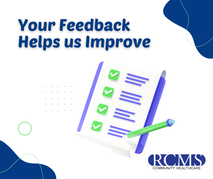RCMS News and Events
|
Stay Connected with RCMS
Scroll down to see the latest updates and click the button below to subscribe to The Pulse to get regular updates from RCMS directly to your email inbox. |
|
Stay Connected with RCMS
Scroll down to see the latest updates and click the button below to subscribe to The Pulse to get regular updates from RCMS directly to your email inbox. |
Medi-Cal/Partnership HealthPlan of California Transportation Benefits: Getting to Your Medical Visits
Did you know that you may be able to get transportation to your Medi-Cal covered services? There are 4 types of transportation services you can get as a Partnership HealthPlan of California member: 1) Emergency Transportation Services Partnership covers ambulance services. Call 911 right away if you need emergency transportation. You do not need to ask your doctor. 2) Non-Emergency Medical Transportation (NEMT) Partnership covers transportation to medical services and appointments. This is for when you have a health issue that makes you not able to get to your visit by car, bus, train or taxi. Ask your doctor for NEMT services. Your doctor will know what kind of transportation service you need for your health issues. If you need help getting out of your house, getting into a vehicle, and/or getting into a medical office, you may be able to get NEMT services. Types of NEMT services are:
3) Non-Medical Transportation (NMT) Partnership also covers rides in cars, taxis, buses, or through gas mileage payments to get to medical visits. You may be able to get:
4) Additional Benefits for Travel Expenses Partnership may cover:
Call Member Services at (800) 863-4155, Monday – Friday, 8 a.m. – 5 p.m. for questions about Partnership benefits. TTY: Call (800) 735-2929 or 711. Please have your ID number or ID card ready. Carbon monoxide, or “CO,” is an odorless, colorless gas that can kill you.
Where is CO found? CO is found in fumes produced any time you burn fuel in cars or trucks, small engines, stoves, lanterns, grills, fireplaces, gas ranges, or furnaces. CO can build up indoors and poison people and animals who breathe it. What are the symptoms of CO poisoning? The most common symptoms of CO poisoning are headache, dizziness, weakness, upset stomach, vomiting, chest pain, and confusion. CO symptoms are often described as “flu-like.” If you breathe in a lot of CO it can make you pass out or kill you. People who are sleeping or drunk can die from CO poisoning before they have symptoms. Who is at risk from CO poisoning? Everyone is at risk for CO poisoning. Infants, the elderly, people with chronic heart disease, anemia, or breathing problems are more likely to get sick from CO. Each year, more than 400 Americans die from unintentional CO poisoning not linked to fires, more than 100,000 visit the emergency room, and more than 14,000 are hospitalized. How can I prevent CO poisoning in my home?
 We send surveys to our patients to get their feedback on our service. The feedback helps us know what we are doing right and where we can get better. The results of the survey are used by our performance improvement and quality improvement teams and are actively used to improve our delivery and provide you with the best possible service. Here are some excerpts from our survey responses: "The whole experience was enjoyable and informative. No changes necessary." "All staff were very professional and very nice. I felt I was getting the best care possible." "You know the answer - recruit more MD providers." "I was seen immediately and the level of attention and examination was beyond! I was so incredibly impressed and grateful, I give my provider highest marks on all counts. The entire team was kind and helpful." "RCMS Urgent Care is the best in Mendocino Co and Sonoma Co." Please note our hours by location this holiday season. Have a safe and healthy Christmas and New Year's.
|
News & EventsLatest news and information on upcoming events at RCMS Archives
July 2024
Categories |